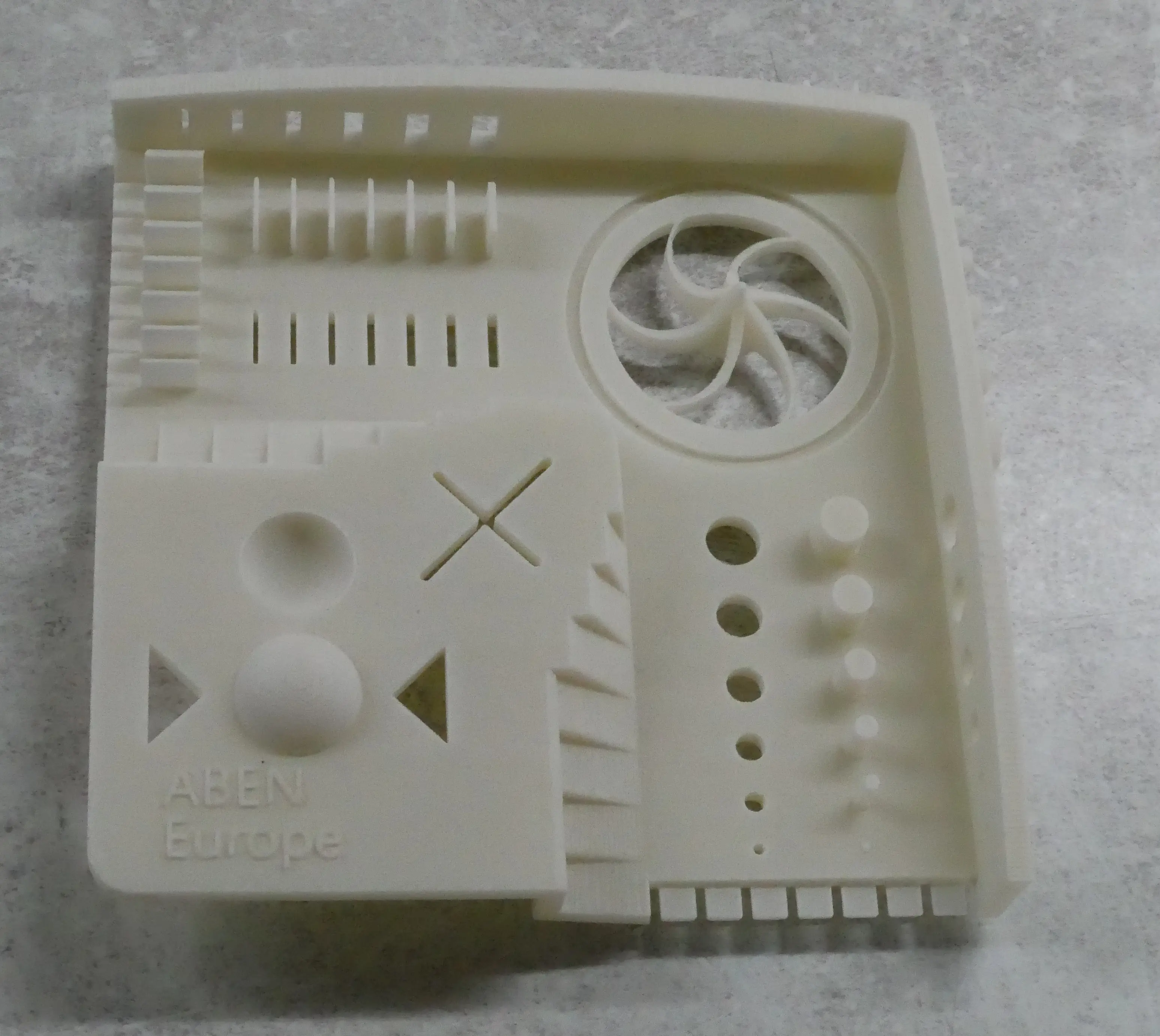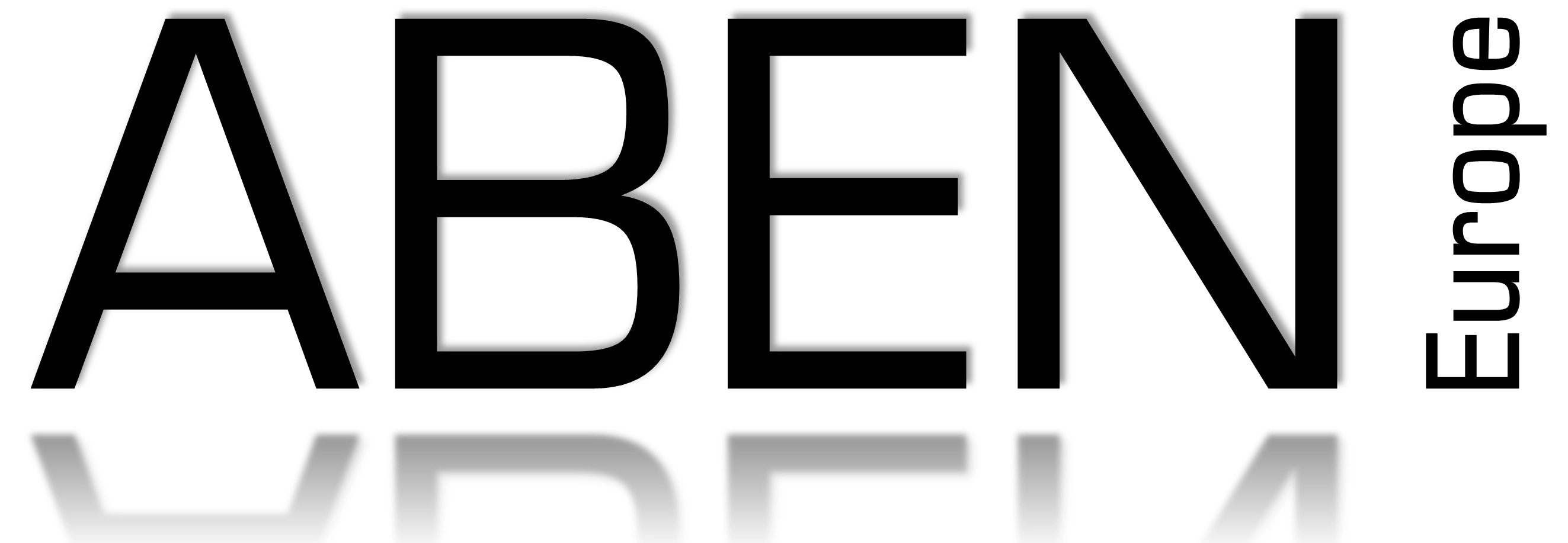Selective Laser Sintering (SLS) Services
Selective Laser Sintering (SLS) is a process which produces single or multiple solid objects in a nylon based polymer by the selective melting of polymer powder. It is effectively a method of making plastic parts, in an engineering material, with no need for tooling.
Selective laser sintering is one of the earliest and most developed techniques of 3D printing. It was originally developed in 1984 by Carl Deckard of the University of Austen, Texas, who founded the DTM Corporation. The technology will be 40 years old in 2024.
The process makes some of the most robust and durable polymer components of any 3D printing process.
As with all additive manufacturing, the SLS process requires a 3D CAD model. Virtually all 3D CAD model formats can be accepted by Aben Europe.
The 3D CAD model is sliced into a series of 0.1 mm thick layers which are then transmitted to the additive manufacturing machine.
Selective laser sintering utilises a laser to selectively melt a nylon 12 powder material into the shape required for each layer contained within the slice file. Each layer is built on top of the last until the physical model is complete. The model is then removed from the machine, cleaned, and can then undergo subsequent processes or simply be shipped to the customer.
Parts built by the SLS process requires no support structure, and therefore parts can be manufactured in a 3D array, making the process highly efficient and so suitable for low volume production applications.
Parts manufactured by the SLS process are almost as accurate as those produced by SLA but are tougher, and more resilient, and do not undergo subsequent dimensional changes.

Material for SLS
The SLS parts supplied by Aben Europe are supplied in high quality Polyamide 12 Nylon. This material:
Is durable thermoplastic with balanced mechanical properties and fine-feature surface resolution
Is for real world functional testing and low to mid-volume production runs. Capable of meeting UPS Class VI
Is superior chemical resistance
Is well suited for manufacturing of functional prototypes, manufacturing of individual units as well as serial parts
PA12 has excellent resistance to:
- Greases and oils
- Fuel and hydraulic fluids
- Water, alkalis, salt solutions and many solvents
- It also has very good stress cracking resistance even in the presence of chemicals as well as damping of noise and vibration.
Materials Selection Guide for SLS
Rating System
| DuraForm PA | Duraform GF | |
|---|---|---|
| Base Material | Nylon/PA12 | Nylon/PA12 |
| Stiff/rigid | •••• | |
| Non-rigid/durable-tough | •••• | |
| High-temperature resistance | ••• | |
| High elongation | ••• | |
| High-impact strength | •••• | |
| Accuracy | ••••• | •••• |
| Surface finish | ••••• | ••• |
| Colour | White | Pale Grey |
| Recommended Applications | ||
| Production Parts | ••••• | ••••• |
| Snap fits/ living hinges | •••• | |
| Automotive design | ••••• | •••• |
| Aerospace parts and ducting | •••• | •••• |
| Medical applications | ••••• | |
| Jigs/fixtures/tools | •••• | ••••• |
| DuraForm PA | Duraform GF | |
|---|---|---|
| Sinterered Part Density (g/cm ³) ASTM 792 |
1.03 | 1.49 |
| Flexural Modulus (MPa) ASTM D 790 |
1387 | 3106 |
| Flexural Strength (MPa) ASTM D 790 |
48 | 37 |
| Tensile Modulus (MPa) ASTM D 638 |
1586 | 4068 |
| Tensile Strength (MPa) ASTM D 638 |
43 | 26 |
| Elongation at Break (%) ASTM D 638 |
14% | 1.4% |
| Impact Stength (J/m) Notched Izod Unnotched Izod ASTM D 256 |
32 336 |
41 123 |
| Heat Deflection Temperature (°C) @ 0.45 MPa @ 1.82 MPa ASTM D 648 |
180 95 |
179 134 |
| Flamability UL 94 |
HB | HB |
| Hardness ASTM D2240 |
73D | 77D |
Aben Europe supplies two different variants of its nylon material. The first is plain PA12 – a high purity polyamide 12, which produce excellent prototypes in a white colour. The second is a glass filled variant which we call PA12GF.This is a much stiffer material, with a high density. The properties of the two materials are summarised briefly in the table below.
More detailed information can be found in the material datasheets
Applications
The applications of the parts made by SLS are extensive. Part properties are similar to production items, so SLS components are very useful for pre-production functional testing of designs. Indeed such testing is often so successful, that for short production runs, 3D printed SLS parts are used for production applications. A brief list of the applications of SLS parts include;
Pre-production fit and form testing
Functional checking
Parts for the automobile industry
Medical supplies
Pipelines and fittings for water mains
Industrial components
Engineering and architectural models
Architectural adornments
More detailed information can be found in the material datasheets
Finishing processes
Parts can be painted to a variety of finishes, even to a gloss finish and Aben offers a wide variety of colours and can obtain specific RAL numbers upon request. More simply parts can be dyed, which does not change the surface finish, but isn’t the effective and low cost alternative to painting.
SLS Design Guide
View our comprehensive guide to understanding SLS design.
Quoting Guide
To view our how to guide to create your very own SLS quote please follow our how to guide which is avaliable at the link below:
Request a Quote
To start your own SLS quote please follow the link below, or fill in our Request a quote form below.
